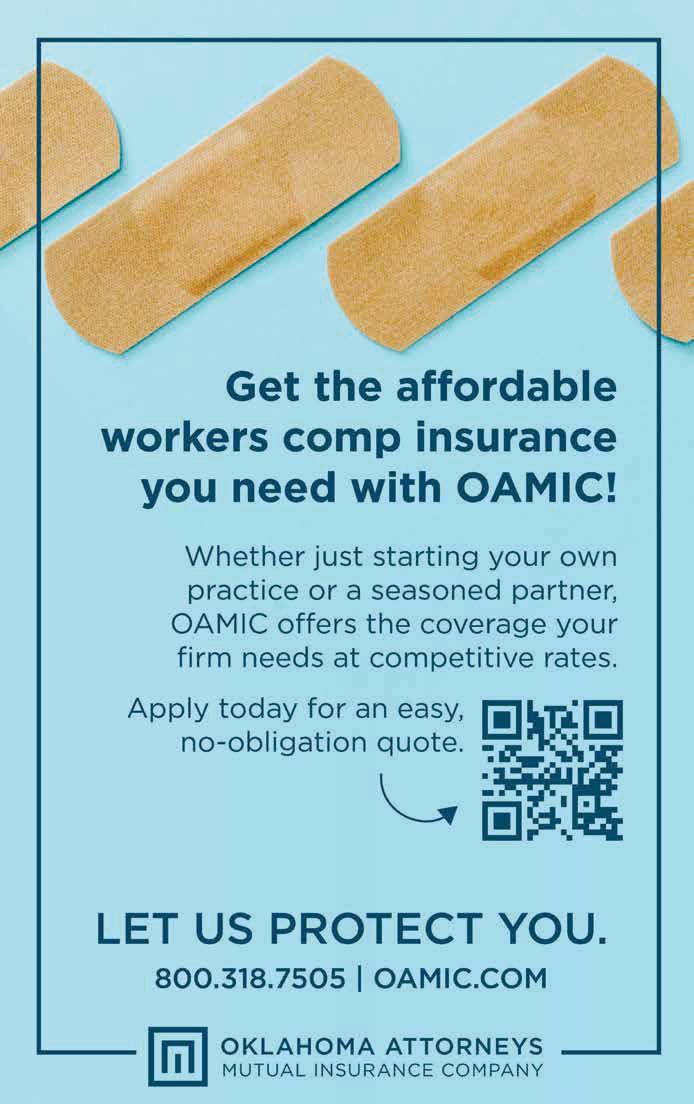Tulsa L Lawyer awyerMagazine







A Message from the President
Stephanie Jackson
2024-2025 TCBA President

2Embracing the Joys of Summer and the Power of Community
Stephanie Jackson










Stephanie Jackson
2024-2025 TCBA President

2Embracing the Joys of Summer and the Power of Community
Stephanie Jackson


By Ralph Schaefer

6Annual Meeting Keynote SpeakerJanet Johnson
6Spotlight on The Coffee Bunker
8Public Sector Employees and InternsIce Cream Social
10Spotlight on City Lights
12Member Event - Family Game Night
13Membership & Value
14Spotlight on Tulsa Lawyers for Children
17Coffee and Coworking Section Gathering
18Voices of the Tulsa County Bar AssociationMbilike Mwafulirwa
22Voices of the Tulsa County Bar AssociationRachel Gusman
24Leadership Academy
Billy Duncan
27FREE - Member Appreciation CLE Mental Health First Aid
28Native American Law Section
Book Club 29Chance Pease ~ A Tribute
31 In Memory of...

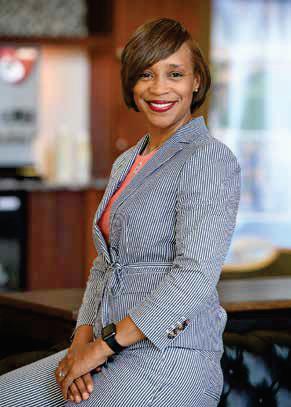
As July unfolds with warm sunshine, long days, and the spirit of celebration in the air, it brings me great joy to wish each of you a very happy summer and a festive Fourth of July!
recharge—not just with family and friends, but within our professional circles as well. I encourage you to take a moment
gathering around a grill, or simply spending a quiet afternoon with a good book or your favorite people.
It’s also a perfect time to renew your membership with the Tulsa County Bar Association. As we continue to build a thriving legal community, your involvement is essential. Being part of the TCBA means more than just staying current with your CLE requirements—it’s about being part of a network that supports your growth, fosters professional excellence, and
Our Tulsa County Bar Association is proud to offer an incredible range of benefits that are tailored to meet the
needs of both new and seasoned attorneys. A major highlight is the opportunity to earn free CLE credits throughout the year, including the popular Bench and Bar Brown Bag CLE series held right at the courthouse. For those who need more CLE OnDemand collection is available anytime on our website, offering high-quality programming
Members can also enhance their experience through section memberships, which provide the chance to connect with others
an additional fee) allow for targeted programming, deeper engagement, and meaningful connections that can boost both your knowledge and your network.
access to the Own Recognizance (OR) privileges card. You can also enjoy the discounted Tulsa County Courthouse security badge, making your daily courthouse visits smoother and more secure.
my disposal was the Lawyer Referral Service through TCBA. It helped me connect with clients, get into the courtroom, and gain vital experience. Today, it remains a meaningful way for attorneys—especially newer ones—to build their practice and serve the public with competence and compassion.
exclusive discounts with several local businesses—a small but welcome perk that can make everyday life a little easier.
Of course, we also know the value of connection outside of the courtroom. Through
, our TCBA fosters real friendships and collegiality. These gatherings provide not just relaxation and fun, but the chance to collaborate, support of this noble profession.
If you haven’t yet renewed your TCBA membership, now is the perfect time. It’s simple and quick to do so. You can renew online at www.tulsabar.com or reach out to Tami Williams or Heather Heck at the Bar Center by calling 918- 584-5243.
Thank you for being part of this remarkable community. Here’s to a joyful July, a renewed sense of purpose, and a summer
Sincerely,
Stephanie Jackson TCBA President, 2024-2025
What continues to inspire me most is the heart of this organization—you, our members. You show up. You give back. You serve with integrity and care. Whether it’s through our Pro Bono Committee or broader community outreach initiatives, our collective efforts have made a real difference in the lives of those around us.
When we engage—whether through CLE presentations, committee involvement, or service projects—we’re not only passion, reconnecting to our purpose, and fueling the sense of
So, as we celebrate the independence of our nation this month, let’s also celebrate the strength of our legal community. Let’s continue to support one another, invest in our growth, and serve with purpose.
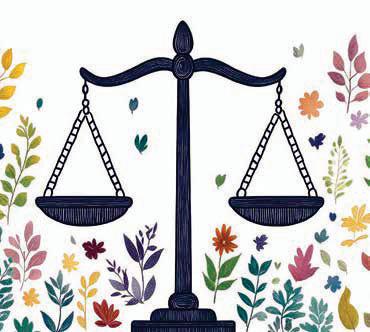
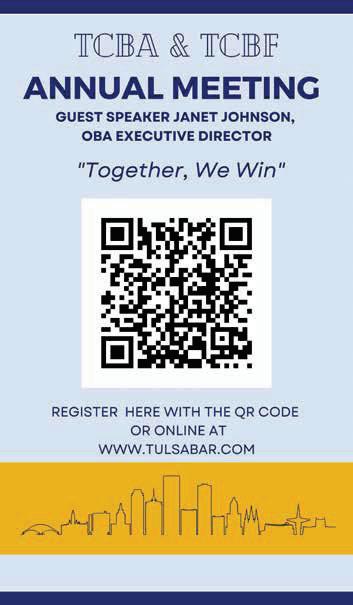
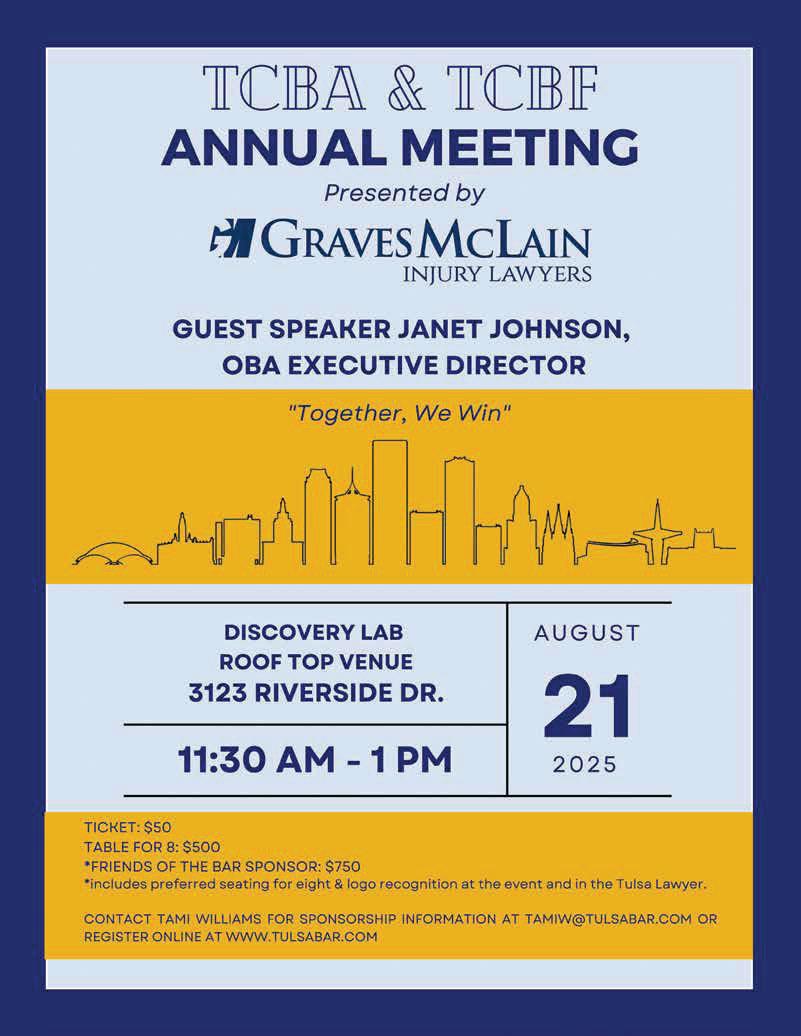
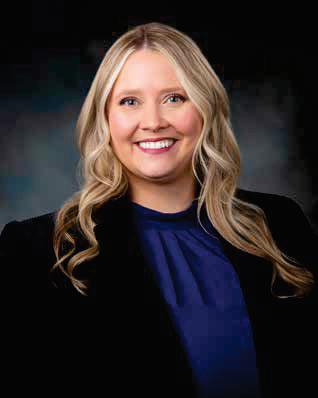
Janet Johnson is the executive director of the Oklahoma Bar Association. Before beginning that role in 2023, she had served as director of educational programs for the OBA Continuing Legal Education Department since 2020.
Previously, Ms. Johnson held different positions within the Department of Human Services' Child Support Services, including serving as managing attorney in the and Legal Outreach. In that role, she advocated as lead counsel in appellate proceedings and managed
legal trainings and workshops for Child Support Services and the legal community. Before joining DHS, she was a solo practitioner focusing on family law and collections.
Ms. Johnson earned her bachelor’s degree in letters from the University of
received her J.D. from the Oklahoma City University 2010. She is licensed to practice in Oklahoma and the United States District Court for the Western District of Oklahoma.


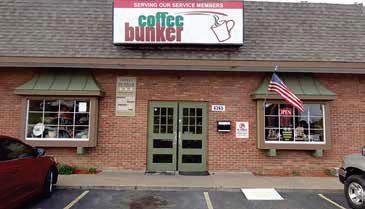
What is the core mission of your organization?
The mission of the Coffee Bunker is to support veterans and their families in their transition to civilian life through personal and professional development. It is to empower veterans to keep moving forward.
When and how was your organization founded?What was the initial inspiration or need that led to its creation?
The Coffee Bunker was founded in September, 2010. The inspiration for the founding is rooted in the story of Marine Cpl. Daniel Ligon, a Union High School graduate. Daniel joined the Marines right after high school and was soon deployed to Fallujah, Iraq. After two years there of heavy combat and support for locals, he exited the Marines and moved back to Tulsa where his transition to civilian life concluded in a suicide. His mother, Mary Ligon, and others in the Tulsa community were determined that this death would not be meaningless. What if Daniel just had someone to talk with? What if Daniel just had some place to get help? The Coffee Bunker was born in the context of that tragedy of a Tulsa family and now continues its efforts to convert the tragedy into triumph. For her efforts in support of veterans, Mary Ligon was inducted into the Oklahoma Military Hall of Fame in 2020.
What is the long-term vision for your organization?
The Coffee Bunker is a unique expression of care by the Tulsa Metro community on behalf of veterans and their families. In the years to come, it is our vision to become a full-service, transition support center for veterans and their families locally, regionally, and nationally.
What are the key values that guide your work and your team?
1) We respect the dignity and value of every person. We honor the service of every veteran. 2) We lead the community in addressing the needs of veterans. 3) We encourage each veteran to reach their potential as a civilian and as a person. 4) We provide assistance with compassion to help veterans meet the challenges of civilian life. 5) We collaborate with of each veteran’s story. 7) We offer peer support and training opportunities for veterans to improve their lives. 8) We foster a safe, healthy environment for connection, belonging, and learning. 9) We believe hope is the foundation for the future.
achieve your mission?
Place: The Coffee Bunker is a unique place for veterans to gather, get essential needs addressed, and be connected with key resources. Community: The Coffee Bunker provides community for socialization, camaraderie, friendships, sense of identity, learning, and good health. Transition Services: The Coffee Bunker provides guidance and training related to employment and career needs as well as for higher education planning and engagement. Volunteer Opportunities: The Coffee Bunker provides a variety of volunteer opportunities for people in the community to serve in support of veterans and for veterans to continue serving in support of the community. Advocacy: The Coffee Bunker advocates on behalf of veterans’ needs and issues locally, statewide, and nationally.Services: VA Claims, Housing assistance, Social work, Chaplaincy, Peer support, Financial advising, Guitar lessons, Food pantry.
describe your target population?
The target population is veterans and their families. They example of the latter is the program we have with the TCC RN department to train RN students in how to address the needs of veterans who are medical patients.
How do you measure the success and impact of your programs? Can you share any metrics or compelling success stories?
Metrics: Last year the Coffee Bunker welcomed over 12,000 visits. On a monthly average, we serve 500 meals,
distribute 130 food pantries, and hand out 120 snack packs to our unhoused. We assisted 20 veterans per month in their employment search. Our chaplains are logging an average of 377 visits per month.
years ago, unemployed and living alone. With encouragement from fellow veterans and staff, he gradually began to open up.
more involved. Over time, Jim found a job, enrolled in online courses, and began sharing his story to inspire others.
Millie, a female Air Force veteran, had spent years as an over-the-road truck driver and was ready to put down roots. One day, she stopped by the Coffee Bunker and quickly realized she had found a place where she belonged. She began volunteering, started her VA claims process, and, with support from Bunker, secured a job. Before long, her family joined her, and Tulsa became their new home.
Chuck, an Army veteran, came to the Coffee Bunker looking for help with housing. At the time, he was living in his truck and struggling to get by. Volunteers and staff quickly stepped in, surrounding him with support. He was connected to housing assistance, provided with groceries, clothing, and— most importantly—hope. Before long, Chuck secured a parttime job, moved into an apartment, and today, he's thriving.
organization aims to solve in our community?
The successful transition of every veteran back into civilian
connection—a place where he no longer felt alone. He began coming in daily for coffee and conversation, sharing stories with fellow veterans. Today, Peter is in a much better place. He’s found purpose again and gives back by volunteering. In his own words, “The Coffee Bunker literally saved my day.”
How is your organization funded? What are your primary sources of funding?
Philanthropic funding: individual gifts, foundation/corporate grants, corporation donations, a variety of fundraising events and programs. Entrepreneurial funding: sales of apparel,
Red Crown Credit Union debit card program for veterans, travel).
Can you provide an overview of how donations are used? What percentage of funds is allocated directly to programs versus administrative costs?
82% to programs. 18% to admin and fundraising.
volunteers are involved in your work? What roles do volunteers play?
Five full-time staff. One part-time staff. One paid social work intern. Approximately 100 volunteers. Some volunteers serve in the daily serving, food pantry, and maintenance roles. Some serve on committees and our board. Many serve on our Holiday Stars & Stripes team. Others are in our programs related to mental health issues.
What are your most urgent needs right now ?
Funding and space.
that our sons and daughters are not only welcomed back from military service, but they have been afforded all the assistance and support needed to become successful civilians.
How do your programs directly impact the local community? What tangible differences do you see? All sectors of employment need capable employees. The segment of potential new employees. In the Tulsa region, approximately 8000 new veterans transition into civilian life every year. Veterans, by their training, and experience communities.
Is there a particular story or a person whose life has been profoundly impacted by your organization that you can share with their permission?
Peter, a Navy veteran, lost his wife of 50 years three years ago. Grieving and isolated, he struggled with depression and suicidal thoughts. Then someone told him about the Coffee Bunker, and he decided to give it a try. What he found was
you working to address it?
do so much more with additional space up to 15,000 sq ft.
Do you involve the community in your decision-making processes or program development?
Yes. We have an active board of directors. Also, we consult regularly with collaborating organizations. or government agencies?
Yes. Examples: 1) TCC Nursing School. We provide training for RN students who want to work with veteran patients. 2) NSU, OU, and TU. We provide opportunities for undergraduate and graduate internships. 3) CREOKS Behavioral Health and Counseling Recovery Services. We
work with them to ensure quickest referrals for local veterans who report mental health crises. 4) There are others.
What would you like more people in our community to know about your organization or the issues you address? I would like for them to know the range of issues we address at the Coffee Bunker. I would like for them to know our need for additional space.
How can individuals and businesses in our community get involved and support your mission?
1) Funding and development
2) Promotion and marketing
3) Locating space
What are your organization's goals for the upcoming year? Are there any new programs or initiatives you are planning?
Goals: 1) Start a paid social work internship, 2) Expand our efforts for entrepreneurial income, 3) Expand our outreach by means of our social media Cyber Bunker
What gives you hope and motivates you to continue your work in the face of challenges?
Our mission is compelling. The people we serve are worthy. Our history of success in life transformations is inspiring. The strength and resilience of our volunteers is amazing.
Is there anything else you would like to share with our readers about your organization?
Our community sends our daughters and sons off to military service with prayers and best wishes. We must welcome them home fully prepared to support them in successfully transitioning back into civilian life.
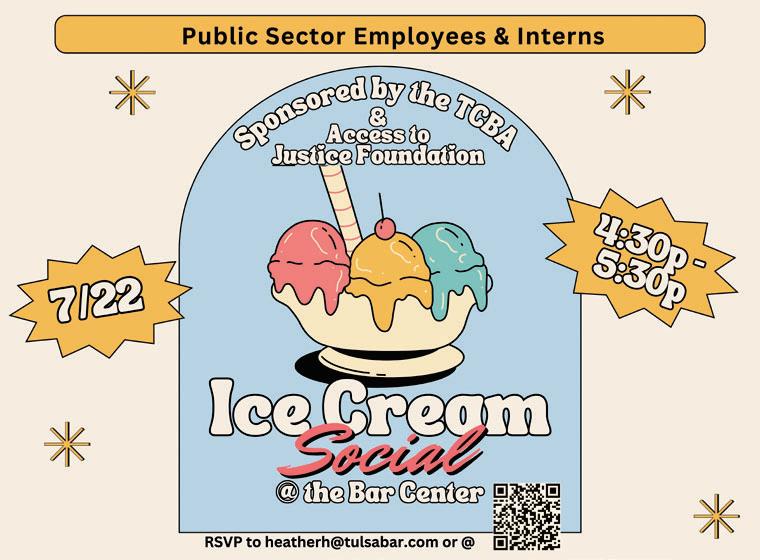
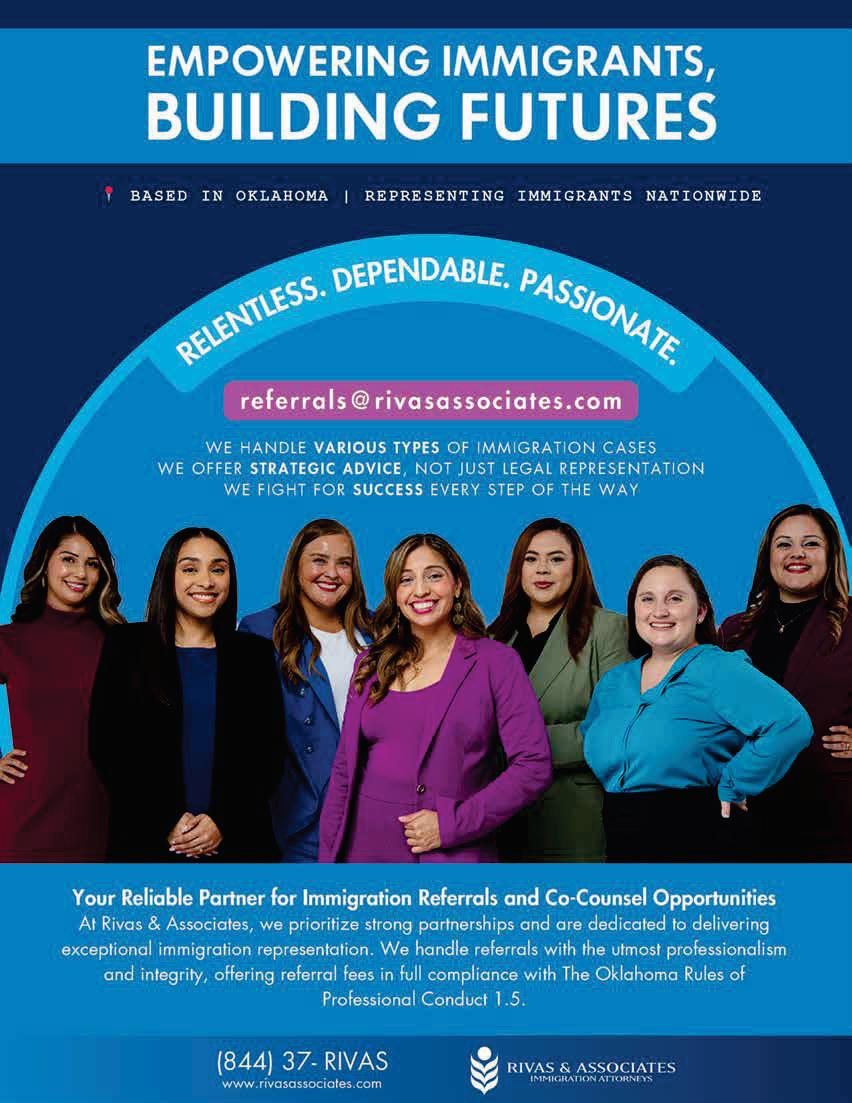

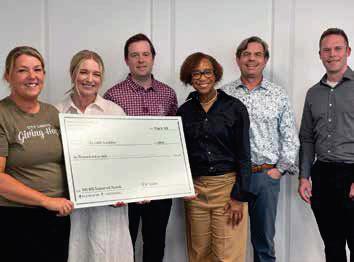
senting the check to City Lights.
What is the core mission of your organization?
City Lights’ mission is loving individuals, giving hope,
housing. We live this out through our four main programs: Night Light, Housing Stability, Mobile Outreach, and the future City Lights Village.
When and how was your organization founded? What was the initial inspiration or need that led to its creation?
In 2013, a passionate calling was placed on our hearts to build relationships with those who are typically ignored and forgotten in society. What started as a weekly meal under operation, including meals, essential resources, connection to the housing system, and deep community with others. Our desire was to step out of our comfort zones and build relationships with people whom we might not normally associate with.
By taking the time to learn someone’s name and listen to their story, we begin to know them more deeply, and we are compelled to reconnect with our shared humanity. We desire relationships that impact others in a way that brings love, hope, and dignity to everyone we encounter. We also want to create places where children, friends, and families can easily serve alongside neighbors.

What is the long-term vision for your organization?
In the next 10 years, City Lights envisions a Tulsa where homelessness is rare, brief, and nonrecurring because dignity, community, and housing are accessible to all of our neighbors who call Tulsa home. At the heart of this vision is City Lights Village, our permanent supportive housing
only a safe place to call home but also the deep and wide community support it takes to exit homelessness and regain a life of dignity and stability.
We also plan to expand our Night Light outreach, which builds trusted relationships through weekly meals and resourceful care in downtown Tulsa, and continue our Housing Stability Program, which helps individuals move into and remain in permanent housing after experiencing homelessness.
to walk alongside our neighbors with compassion, meet immediate needs, and invest in long-term solutions that transform lives.
What are the key values that guide your work and your team?
City Lights' core values are:
•We believe that every person we meet has value and deserves to be treated with dignity.
•We believe that people need and desire community.
•
•We believe in unrelenting service, kindness, hospitality, and hope.
•We believe in providing rest, comfort, and safety to the weary and dispossessed.
•We believe in welcoming and accepting all people.
•We believe in seeking innovative ways to bring about restoration in our community.
your mission?
City Lights has four main programs:
•Night Light Tulsa: a weekly outreach event serving people experiencing homelessness in downtown Tulsa. We provide meals, essential resources, and community to neighbors in need to around 200 people each Thursday.
•Housing Stability: serves around 70 people who have moved out of homelessness and into housing across
42 different apartment complexes. This program offers relational case management, landlord-tenant mediation, transportation to medical and mental health appointments, and a comprehensive support system to help neighbors maintain their housing and avoid returning to the cycle of homelessness.
• Mobile Outreach: In times of extreme weather, City Lights conducts outreach across the city to ensure people have the resources they need to survive or to transport them to shelter. We also partner with the Tulsa Day Center and the City of Tulsa to help run pop-up shelters in winter storms.
• City Lights Village: We are developing a 75-home housing community with wrap-around support services for individuals transitioning out of chronic homelessness. This will be permanent supportive housing. In Tulsa, there are over 1,200 people on the waitlist for this type of housing, and fewer than 13 units are available at any given time. City Lights Village is expected to open in the
describe your target population?
City Lights primarily serves people experiencing homelessness in Tulsa.
Is there a particular story or a person whose life has been profoundly impacted by your organization that you can share with their permission?
Billy*, a young adult who has experienced homelessness since his teenage years, had been regularly attending Night Light Tulsa over the past few years. Through this consistent outreach, our team built a relationship with Billy while providing meals, hygiene/essential items, and a welcoming community.
Earlier this year, Billy was incarcerated for several months following an interaction with the justice system. Upon his release, he returned to Night Light, where he was immediately connected with our housing stability team. Because of this connection, he was able to access critical support services that otherwise would have been out of reach.
incarceration was securing safe and stable housing, which is a common challenge for young adults reentering the community after jail, especially when lacking family
Billy's story highlights the crucial role Night Light plays in the broader continuum of care throughout our community. For individuals like Billy, the program serves as a vital access point to resources, relationship-based support, and housing advocacy, helping break cycles of instability and create real, lasting change.
How is your organization funded? What are your primary sources of funding?
City Lights relies on the generosity of our community to fund our mission. We have a large donor base of individuals, businesses, and foundations. We also offer weekly and annual Night Light sponsorships and have an annual event: Trivia Night at Cain’s Ballroom each fall.
volunteers are involved in your work? What roles do volunteers play?
City Lights is a small but mighty team! We have seven full-time staff members and rely heavily on volunteers to members who help run the stations each week. We also have additional volunteers from the broader community who assist and pack clothing and other donations used for Night Light. We couldn’t do what we do without the volunteers who come alongside us!
What are your most urgent needs right now ?
Summertime always brings shifting needs for our neighbors experiencing homelessness. We rely on monetary donations to provide the services that we provide day in and day out. Aside from that, we also see an increase in the need for essential items such as travel-size shampoo and conditioner, body soap, bug spray, and sunscreen. These items help as we prepare for the heat of Oklahoma. Shoes are also always in high demand, especially as the concrete starts to warm up.
Do you involve the community in your decision-making processes or program development? Do you collaborate agencies?
persistence but strong advocacy.
Thanks to Night Light’s support and our partnership with
working to place him in his own apartment. He is currently on track to secure permanent housing in the near future.
City Lights believes deeply in the power of collective impact and collaboration. Nothing we do can be done on our own! We are active members of our city’s continuum of care, A Way Home for Tulsa. This is a partnership of all agencies in Tulsa working to make homelessness rare, brief, and nonrecurring in our community. Sarah Grounds is also an elected provider representative on the Leadership Council, ensuring
that the agencies that are doing the work have a seat at the table and their voices are heard.
How can individuals and businesses in our community get involved and support your mission?
You can join us by volunteering at Night Light on any Thursday, donating clothing and other essential items, or making a gift online at citylightsok.org/ donate.
What are your organization's goals for the upcoming year? Are there any new programs or initiatives you are planning?
Stay tuned as we prepare to launch City Lights Village, a permanent supportive housing community
wraparound support for 75 neighbors in need. We plan to share more about this project and the campaign behind it later this year as we work to bring our neighbors home in permanent ways.
What gives you hope and motivates you to continue your work in the face of challenges?
connections we have with the people we serve, as well as the donors and volunteers who come alongside us to make this work possible. There is so much beauty in seeing hope and dignity restored, and it reminds us that the work is worth it.
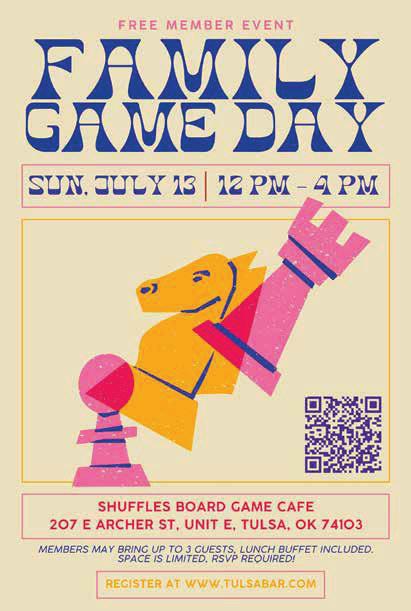



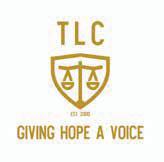
In Tulsa County, 1 in 25 children will experience abuse or neglect in their lifetime. For many, the journey through the child welfare system is both daunting and traumatic. Without someone to stand beside them, their voices are often drowned out in a system overwhelmed by caseloads and complexity.
Consider a child like Emily, just eight years old, entering a Tulsa County courtroom. She has already endured emotional and physical abuse and is now separated from her family. The people around her, judges, attorneys, and caseworkers, are unaware of her story, fears, or hopes. They make decisions about her future, yet no one listens to her voice. Emily's future hangs in the balance, and without an advocate, she risks becoming lost in a system that is too busy and overwhelmed to give her the attention she deserves.
Now, imagine Marcus, a ten-year-old boy whose life changed in an instant when both of his parents were killed in a car accident. Suddenly, Marcus was thrust into unfamiliar surroundings, grieving and afraid. With no family willing or able to care for him, the court had to intervene. But who would speak for Marcus? Who would help the court understand his grief, his needs, and the kind of support that could help him begin to heal?
This is the reality for thousands of children in Tulsa County. Their lives are torn apart by trauma, yet their voices often go unheard. Without advocacy, these children face a future full of uncertainty, instability, and missed opportunities for
Because no child should ever be reduced to a case number, every child, like Emily and Marcus, deserves a champion.
organization founded in 2000 in response to a growing concern: children in the child welfare system urgently needing legal advocacy during one of the most critical times of their lives. Originally formed by a coalition of legal professionals, TLC's mission has remained unchanged for over two decades: to ensure that every vulnerable child in Tulsa County receives strong and compassionate legal representation.
From its grassroots beginnings, TLC has become vital to the juvenile court system. The organization has established a reputation for excellence and integrity, with over 25 volunteer attorneys involved annually since its inception. Its work has led to more timely court decisions, more substantial permanence outcomes, and improved mental and emotional health for thousands of children.
Today, TLC is evolving to address new and growing needs. The organization is shifting focus within the Tulsa County court system, not by changing its mission, but by adapting to
programs, not purpose. The same values and passion that guided TLC's work with children in foster care are now being directed upstream to intervene earlier in a child's experience with trauma and instability.
By expanding its scope and reimagining its impact, TLC is rising to meet Tulsa County's most urgent needs. It aims to ensure that more children have access to legal advocacy before crises deepen and long before they become just another case in an overburdened system.
largely represented children in the foster care system, many of whom are victims of child abuse, neglect, or life-altering trauma.
Since 2000, through the tireless efforts of dedicated pro bono attorneys, TLC has ensured that these vulnerable children have a trusted legal advocate in their corner, someone to protect their rights, elevate their voices, and help shape a path toward healing and stability.
TLC is committed to providing high-quality legal advocacy for vulnerable children in Tulsa County. By offering traumainformed, child-centric advocacy, TLC ensures that every child, regardless of their background or family situation, has and future.
Without TLC, there would be more extended stays in foster care, increased instability, and a higher risk of experiencing
trauma that affects their mental, emotional, and physical development. Without TLC's intervention, these children may face years of uncertainty, missed opportunities for without a stable, permanent home. futures.
Mission: To ensure the effective and zealous representation of vulnerable children in Tulsa County by providing childcentric, trauma-informed legal advocacy at low or no cost.
Vision: Every child in Tulsa County will have a voice in the stability, and a permanent, loving future.
Core Program: Guardian ad Litem Services
Program. A GAL is a court-appointed advocate whose sole duty is to represent the child's best interests in a dependency or neglect case. This role is distinct from an attorney for the parent or the state; the GAL exists solely to advocate for the child's safety, stability, and long-term well-being.
TLC provides attorneys who serve as GALs for children in Tulsa County's juvenile courts. These attorneys investigate cases, meet regularly with children, collaborate with caseworkers and families, and provide critical recommendations to judges on placement, mental health
This legal representation is essential for navigating complex court proceedings and is a lifeline for children whose best interests might be drowned out.
TLC offers a comprehensive range of services aimed at protecting and advocating for children throughout the child welfare process. These services help children heal, reunite and permanent homes.
• Guardian ad Litems and Legal Representation
TLC attorneys represent children in deprived cases and juvenile mental health treatment cases and serve as Guardian ad Litem in family court proceedings such as custody issues, guardianships, and adoptions, ensuring their voices are heard, and their best interests are upheld. These advocates champion the child's rights to safety, stability, and permanency throughout the legal process.
• Post-Adoption Contact Agreements (PACAs)
TLC attorneys assist in negotiating PACAs for children being adopted, legal agreements that allow for continued
contact with biological family members. These agreements help maintain a child's sense of identity, history, and emotional continuity.
• Family Team Meetings
These gatherings unite families, caseworkers, and other stakeholders to plan for the child's future collaboratively. TLC ensures the child's voice is present and that all
• Therapeutic Advocacy
TLC's representation extends beyond the courtroom. TLC connects children and families with vital mental health resources to support emotional healing and mitigate the effects of trauma.
Approach & Philosophy
TLC believes that every child deserves a fresh start. Recognizing the uniqueness of each case, TLC's approach is tailored, compassionate, and anchored in traumainformed care. The organization supports children and
facing overwhelming circumstances such as addiction recovery, poverty, or domestic violence. Whether helping a parent through voluntary relinquishment or advocating empowered, and given opportunities to heal.
• The Need: Systemic Challenges in Tulsa County
The challenges faced by children in the foster care
strained system. The following statistics underscore the urgent need for support:
• High Number of Cases of Child Abuse and Neglect In 2022 alone, 13,921 children in Oklahoma were represents a child in need of advocacy.
• Overburdened Court System
children every year. With such a heavy caseload, many children are left without the advocacy they deserve. TLC's volunteer attorneys help bridge this gap, ensuring every child has legal representation.
• Mental Health and Education Barriers
Up to 80% of children in foster care struggle with mental health challenges and are at a higher risk of dropping out of school; only 50% graduate high school on time. These challenges highlight the importance of comprehensive legal advocacy to ensure the child's safety and future well-being and success.
• Aging Out Without Support
facing incarceration between the ages of 17 and 21. These young adults often lack the skills, resources, and support networks to succeed. TLC strives to develop plans for these youth to transition successfully into adulthood.
TLC's model of early, consistent legal advocacy results in powerful outcomes for children:
• Accelerated paths to permanency, reducing the duration children spend in foster care
• Enhanced mental health outcomes due to traumainformed representation and quicker access to services
• families when appropriate
• Greater stability for older youth, aiding them in transitioning successfully into adulthood
• More decisive judicial decision-making, as judges rely on the GAL's recommendations to make child-centered rulings
• Holistic approach to adoption, allowing space for the child to process their position in the adoption triad
• Full utilization of available funds, ensuring children in guardianships or adoptions receive the maximum support for services like daycare and mental health care
TLC's impact stretches beyond the courtroom. With each child it serves, the organization chips away at the cycles of trauma, poverty, and instability that can echo across generations.
The work of TLC goes beyond mere statistics; it focuses on real people, children whose lives have been transformed through TLC's efforts.
Before her 18th birthday, a young woman faced the threat of homelessness. Through TLC's Feather the Nest project, the organization assisted her in accessing transitional housing and furnished her with a new space. Today, she is enrolled in college classes, completing high school, and working two part-time jobs, all while building a strong foundation for adulthood.
facilitated safe visitation, helping her gain independence and reunite with her 3-year-old.
TLC recognizes that lasting change for vulnerable children requires a strong support network. Legal advocacy is just one part of a broader system of care. TLC is proud to collaborate with community partners committed to protecting children, supporting families, and building safer futures in Tulsa County.
Through close partnerships and strategic referrals, TLC connects children and families with essential services that promote healing, stability, and long-term well-being.
Key community partners include:
• The Parent Child Center of Tulsa: A leader in early intervention and trauma-informed care, working to strengthen parent-child relationships and prevent child abuse and neglect.
• (DVIS): Providing critical support for survivors of domestic violence and sexual assault through emergency shelter, counseling, and legal advocacy.
• Early Settlement Center for Mediation: Offering accessible mediation services that help resolve family disputes and reduce the need for adversarial court proceedings.
• The Spring Shelter: A haven for youth in crisis, offering emergency shelter and wraparound support for children and teens facing instability.
These partnerships allow TLC to extend its impact beyond the courtroom, ensuring that every child served has access to a full continuum of care. These organizations create a stronger safety net that honors each child's dignity and supports their path toward a brighter future.
Tulsa Lawyers for Children operates with a modest yet highly
range of critical services, including:
• Recruitment, training, and supervision of volunteer attorneys and Guardians ad Litem
• Oversight by staff attorneys for complex and high-need cases
Courage to Reunite: Protecting a Mother's Rights with her child. TLC maintained open communication and
• Court representation and ongoing case monitoring
• Coordination of mental health and therapeutic advocacy
• Administrative operations, reporting, and case management infrastructure
Despite operating on limited funds, TLC maximizes the impact of every dollar by leveraging the invaluable time and talent of its volunteers, whose contributions are valued at over $228,200 annually if billed at standard legal rates.
to meet the community's growing needs and provide the comprehensive support that every child deserves.
While TLC delivers essential services at no cost to children, maintaining these services requires a robust and sustainable infrastructure. The demand for GAL representation is rising, but TLC's capacity is currently constrained by funding and critical needs, including:
• Expanded staff capacity to accommodate the increasing caseload of children requiring legal advocacy
• Upgraded technology and case management systems to
• Increased training resources for attorneys to stay informed on trauma-informed and culturally competent practices
• Dedicated support for youth aging out of foster care, focusing on housing, education, and legal navigation services
• Investment in mental health advocacy, including integrating therapeutic services into legal care planning
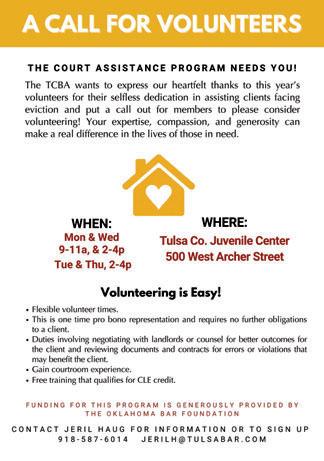
These needs are essential for maintaining the quality and scope of TLC's services as the number of vulnerable children in Tulsa County continues to grow.
The work of Tulsa Lawyers for Children is vital. Without its advocacy, thousands of children would be left to navigate the legal system without representation, a plan, or a path toward healing.
foundations, and community partners to provide lifechanging legal advocacy. Every contribution plays a crucial role in ensuring that every child has a voice, every story is heard, and every future has an opportunity to be rewritten.
Support the mission to change a child's life trajectory by partnering with Tulsa Lawyers for Children.
To ensure the effective and holistic representation and advocacy of vulnerable children in Tulsa County by providing high-quality legal advocacy in the form of attorneys and specially trained guardians ad litem.
Every child in Tulsa County will have a voice in the legal and a permanent, loving future.
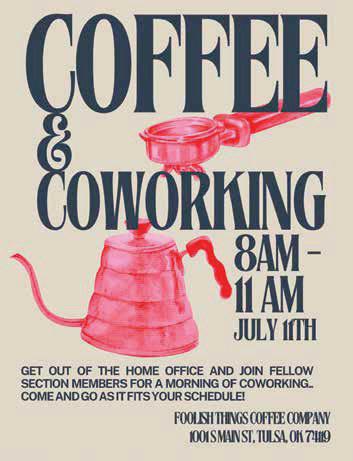

Three women have shaped the arc of Mbilike M. Mwafulirwa’s eventual life in the law—call it a three-tiered real-life version
planted the seed of his life as a lawyer. She suggested he become a lawyer and even took him to a presentation by the British institution he would later attend. Several years passed before the second woman entered the story: his sister Temwa, who entered her brother’s name—alongside those of other family members—in the U.S. government-sponsored green card lottery. Those two events, although several years apart, made it possible for a young African from Malawi to come to the United States and then to Tulsa to begin an unlikely journey in the law. But coming here is only part of the story. What happens when Mbilike gets here is just as important. Enter the third woman—his wife Christobel, a steadying presence in his life who for the last decade has been instrumental in helping him reach several milestones , including those that he still hopes will someday unfold.
These days, Mbilike is a partner at Coffey Senger Hancock
become a full-service civil litigation practice. Additional talent has been added to make that growth and vision possible. Along with his federal and state court practice that encompasses civil litigation, trials, and appeals, Mbilike also
But for Mbilike, if he has achieved anything that might be considered meaningful, it is all part of a larger American story that he thinks is bigger than himself. It is that quintessential American-Dream story of a person who has been able to succeed in a nurturing and caring small American city. So many good people have rallied around him and made it possible for him to strive and to eventually become the best he can be. Call it his turtle moment, Mbilike says. As the saying goes, if you see a turtle high up on a fence, just know someone helped put him there. In fact, this ties in well with Mbilike’s overall philosophy: “I am one of those people who
self-improvement is ongoing, that one should always strive to improve and look to contribute.”
By Ralph Schaefer
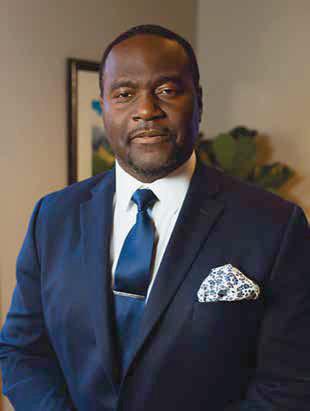
That philosophy of continuous growth and contribution recently led to two unexpected honors. First, Mbilike was surprised when his peers recommended him for selection to the Oklahoma Advisory Committee to the U.S. Commission on Civil Rights, an organization that examines pressing civil rights issues across all states, including Oklahoma. He assumed his role in March 2025. “I think you bring whatever assist the commission,” Mbilike said. “You look into and advise on issues drawn from those experiences.” It’s a role that will challenge him to grow and contribute to something bigger than himself, Mbilike said. Second, Mbilike received a surprise CLE award from the Tulsa County Bar Association
co-chair of its litigation section. The Brunton-Will CLE award honored him for developing “meaningful and thoughtprovoking educational programs” for attorneys and the community service to the TCBA and the public.
All this still begs the question: what made him the lawyer he is today? To understand the man, you must understand his journey. Or, as Malcolm Gladwell once put it, “Who we are cannot be separated from where we’re from.”
For Mbilike, home was originally Malawi, a small southeastern African country bordered by Zambia to the west, Tanzania to the north and northeast, and Mozambique to the east. Malawi has a large freshwater lake that covers most of its area. When Mbilike was growing up in Malawi, there were two
put together by the Malawi government. The other was the by the University of Cambridge in the United Kingdom. Under that Cambridge system, high school exams taken in Malawi were graded in the United Kingdom, Mbilike said. Mbilike had no thoughts about becoming a lawyer after high school. “I was one of those people who came out of high school and if you looked at my grade transcript, it suggested that I was a guy who was a jack of all trades and a master of none,” he said. “I always envied those who knew their career path when they graduated from high school.” His mother suggested a legal career, noting “you really like to argue points” and “you like to talk a lot.” And the rest, as they say, is history.
Mbilike’s legal journey began when the University of Wales awarded him his British law degree. He earned a qualifying law degree, which according to the Bar Council for England prerequisites for further practical or vocational study to
considering where he might establish a legal practice, either in the United Kingdom or his native Malawi.
Then everything suddenly changed. “One Friday afternoon my parents contacted me saying a letter had come for me and I had won something—a green card,” Mbilike said. “At
daughter, and Mbilike’s sister already in the United States, had “religiously” entered the names of the entire family into the green card lottery. With millions-to-one odds against him, Mbilike’s name was drawn. “I think the only lucky part is your name being drawn,” he said. “There is a very economically or contribute to the United States and whether they are in good health. Credentials are evaluated, a security check is conducted, and the health screening was one of the most extensive I have ever had in my life.”
Soon after, Tulsa was his destination. Mbilike picked Tulsa, in part, because his sister lived here and many people in his support system were also here. “When I came to Tulsa, one
do with this massive opportunity in another country with an English law degree,” he said. Mbilike knew he couldn’t start practicing law with his British law degree because the legal systems and rules were different between the countries.
Tulsa quickly grew on him. What is fascinating about Tulsa Mbilike says, is that it has a way of showing its better qualities in the most unexpected ways. To begin with, “I made some good friends, attended Victory Christian Church, had a steady contingent of international friends from other African countries and we played soccer together." And then he laughed as he recalled how he arrived at the University
working at Kentucky Fried Chicken at 71st and Memorial,” he recalled. “I made some friends while working there, and one guy in particular suggested that I ought to do something with my brain.”
Suddenly, Mbilike was driven to the University of Tulsa law school before worrying about money.
program, Mbilike had an interesting idea that would alter the trajectory of his legal prospects. After reading the TU College rules that governed law schools at the time, he believed he had found that those rules, when read together, allowed for him to be admitted into both the LLM and JD programs simultaneously, with advanced standing, for the same price, and without additional admission testing. He researched and wrote a petition to the law school dean at the time, Janet Levit, presenting a supporting legal argument for his admission. At the time, there was no precedent at TU Law— or in Oklahoma—for this creative legal approach. Luckily for him, the gambit worked. He graduated with two law degrees for essentially the price of one, in record time.
a civil litigator begins at the W.C. Bradley Legal Department, a Georgia-based private holding company. There, as a legal intern, Mbilike helped the senior lawyers guide a subsidiary business through an industry-wide product recall and federal agency product inquiry. Work at the legal department included drafting corporate policies and documents for the varied business units, assisting business executives and senior attorneys with mitigating reputation damage, unauthorized performed legal research for the general counsel, Don Freeman, on various matters. His prior knowledge of European law proved valuable in European acquisitions, where he worked on and researched E.U. Competition law and Merger Rules,
European consumer protection laws including labeling requirements, product safety and packaging regulations, foreign product registration requirements, and consumer data protection policies.
Whatever spark his internship ignited, experiences with him in a career as a civil litigator. First up was McGivern workers’ compensation defense under Paul V. McGivern, Jr. and Michael G. Gilliard. There, he tried cases, took and defended expert and lay depositions, and authored appellate briefs and petitions for certiorari with the Oklahoma Supreme Court. This position also provided occasional forays into civil district court work, for example, successfully arguing for and securing a stay of continuing wage garnishment for a colleague. But after the 2011 amendments to the workers' compensation statutes, the practice area landscape develop into a district court litigator, caused him to move.
At RRB, Gary L. Richardson taught Mbilike the art of storytelling in litigation. Before that moment, he had never and employed so effectively to advocate for client positions. While also there, Chuck Richardson, Jason C. Messenger, and Melissa A. East, taught the aspiring civil litigator the legal craft and gave him an important introduction to state and federal district court litigation and practice. He handled civil litigation matters, not limited to civil rights, employment law, appeals, wrongful death claims, car wrecks, slip and falls, breach of contract and general common law theories.
If RRB was his introduction to the craft, then Brewster Brewster, Jennifer De Angelis, Guy Fortney, Monty Lair, legal questions not yet addressed by Oklahoma courts, and worked them to successful conclusion. Besides the usual staple of personal injury and medical malpractice representing individuals and their small businesses in administrative and civil enforcement actions by agencies, were complex and demanding, sometimes in locations other than Oklahoma. That meant he had to seek and was granted limited leave by courts in other jurisdictions to practice in different jurisdictions, Texas, California, or New York, for example, and other federal courts around the country. It was a humbling experience for the traveling attorney. As he put it, you quickly discover that legal talent exists everywhere— other attorneys possess skills that match or exceed your own.
and three civil bench trials also defending.
Mbilike also learned at Brewster that a traveling lawyer faces unique challenges. For local cases, it is often easier to
travel, you might have a week-long trial in one state, then move on to another state for a new trial or hearing. That can take its toll.
The question is how to balance those competing concerns
a perfect solution to this paradox. But luckily for him, he has a supportive wife, Christobel, who makes it possible for him to do what he does in the law. She is the mother to his wonderful two young kids, Israel and Zion. She is a steadying and assuring partner, who goes out of her way to make sure that her husband excels in law and in life. It was Christobel
scholarly pursuits. She has suffered through several practice runs of lectures, speeches, oral arguments, and proof-reading drafts of articles.
Mbilike’s story would be incomplete without a word or two
before ChatGPT entered the public consciousness. He has researched, written, published, spoken, and taught on the subject since that time, initially exploring how smartphones and smart technology could be used by law enforcement as possible witnesses in crimes and how the FBI was asking federal courts to help them “break” into iPhones to investigate criminal cases. “Most of us are really enamored with the generative aspect of AI,” he said. “Even before GPTs, there
intelligence was found in early computers themselves with their smart capabilities.” Besides publishing peer-reviewed scholarly articles, he was, at the time, also giving lectures and talks to sizeable national gatherings of legal professionals. When ChatGPT arrived on the scene, he incorporated it into his lectures and speeches at national gatherings and before a Fortune 500 company, McDonalds, and in his scholarly publications. He soon recognized that the legal profession was falling behind and needed to learn to use generative AI technology responsibly. There have been several cases with lawyers and others misusing the generative AI tools or using them incorrectly, he said.
That is why TU Law now has a program that instructs students about the proper use of AI. Mbilike teaches one of those classes. According to Mbilike, the law students are being prepared to responsibly incorporate AI into everyday legal practice. TU Law students also need to know how to analyze legal problems involving AI. For example, several copyright questions involving AI are currently before the courts as judges grapple with determining what is copyrightable and
constitutes fair use in the AI era. Students need to be prepared on both fronts—to responsibly use AI and to analyze and resolve legal questions brought on by the advent of AI in
How does one close a tale as humbling as Mbilike’s? If you
with heart-felt gratitude. He readily admits that, if his own experience and journey is anything to go by, it is hard for someone who started from where he did to end up on such a rewarding and far-reaching path without help from others. “I have a wonderful set of people and community,” he said. “I think I have to give back to a community that is so important to me and that has given so much to me. I try to give back through the TCBA, pro bono work when I can, and through my teaching and scholarly contributions to the profession and the public.” Mbilike particularly loves Dr. Martin Luther King Jr.’s “Three Dimensions of a Complete Life,” he said. Dr. King, Mbilike said, envisioned “life being like an equilateral triangle where all sides are equal: the length of life being the inward concern for one’s own interests. The rational self-interest. The breadth of life being the outward concern for others. Finally, the height of life, for me, is my relationship with God.” For
in a purpose-driven and deeply rewarding life that continues to unfold.
This innovative project, by the TCBA Law Week Committee, aims to preserve and share the rich stories of our members and the history of the Association.
Members interviewed are encouraged to contribute their unique experiences and insights, and their connection to the TCBA. Through this histories that shape our community.
Leading the project and interviewing
interviewed U.S. Supreme Court Justices and did
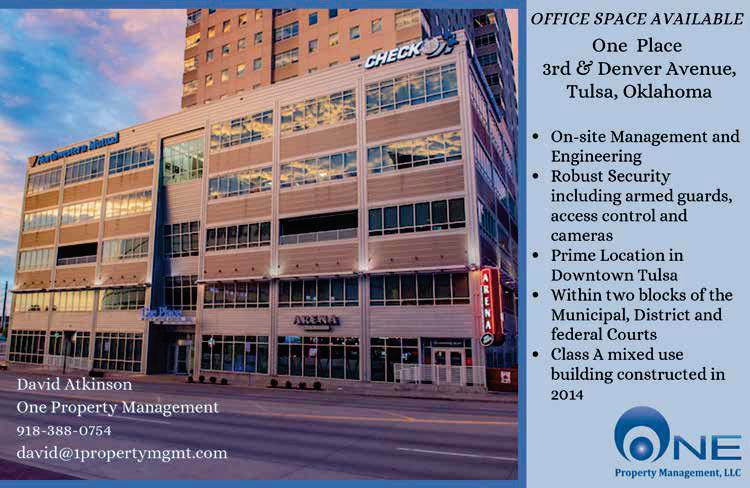

Julia Gusman was concerned when her daughter earned a degree in criminal justice from Washburn University in Topeka, Kansas. That was because Rachel was considering either a career in law enforcement or a career as a lawyer.
Rachel recalls her mom saying, “Please don’t make me stay up at night wondering what's happening to you. Please go to law school.”
Rachel had been working at Zale’s in Topeka, earning money to put herself through college. Graduation meant it was time for the “rubber to meet the road” with that criminal justice apply to a police law enforcement academy or attend law school.
A friend told her about Tulsa and that she was going to apply to the University of Tulsa College of Law while also boasting about the city’s beauty.
Rachel knew she wanted to check out that place. “So, my visited the law school campus. I loved it, applied, and was accepted.”
Rachel didn’t have a particular law career in mind when she started law school. She wasn’t sure whether she wanted to work in public service or work as a lawyer in private practice.
She took the required criminal law classes and “was not a fan.” Family law and international family law classes piqued her interest, and she saw a potential career path. However, that direction changed when she joined the Graves Barkett Law Firm, which practiced personal injury and construction law.
she met Dan Graves, a partner with Graves Barkett Law Firm, and began her clerkship. “Dan liked me, and I liked him,” she recalls. Also at that time, Chad McLain was an when Barkett left and Chad became a partner.
Now, nearly two decades later, Rachel is a managing partner at Graves McLain Injury Lawyers. Her role involves mentoring young associates in the same way she was mentored as a young lawyer.
By Ralph Schaefer

as a law clerk, both Dan and Chad have been tremendous mentors to me,” she said. “I credit them for the lawyer I have become and the business accolades I have achieved in running a law practice of this magnitude. They have been instrumental in my growth as a lawyer.”
“A law career is challenging, but in a good way,” Rachel continued. “You cannot predict the fact pattern that will have to be developed, whether it involves a person falling down defective stairs or someone being bitten by a dog. There’s always something new to challenge you.”
and the amount of technical information one must learn to prosecute those cases sometimes makes one wonder if perhaps they should have become a doctor,” she added.
“While these issues are challenging, it is essential to understand the case and its implications for the law,” Rachel said. “The reward is when you know you are helping a family receive compensation for the loss of their loved one
or the loss of a limb or something that was catastrophic to their lives.”
One case that Rachel worked on early in her career involved a young girl who was harmed by a vaccine. “I helped her get money through a federal government program, that if she lives to her life expectancy, will pay out something like $80 million for her care,” she said.
Practicing personal injury cases, like the ones Rachel describes, involves another’s negligence, whether it is because of a car accident, excessive force, equipment failure, medical mistakes, or other liability issues.
Putting it into perspective, Rachel smiled when she recalled a lawyer so he “could get rich.”
“I think everyone goes to law school with some intent and bigger purpose,” she said. “That may change with the law school experience. It depends on what you want to do with your career.”
pay off student loans. This changed when she began to see and the importance of determining what motivates you to the opportunity to help the people they work with, or a deep interest in a particular area of law.
“I think that passion, genuine passion for what I do and what I’ve helped build, is what motivates me to come to work every day,” Rachel said.
little girl from Dodge City, Kansas,” if someone told her that her future would be in Tulsa with “two great lawyers, running across the nation - I would have told them they were crazy.”
Rachel further shared that one of the highlights of her career is the brick-and-mortar facility at 4137 South Harvard in Tulsa,
practice. Beyond just the physical location, she takes pride in a great place to work.
“Then if I look at it personally, I’m so damn happy that it is successful, and it is really rewarding. I don’t think I would want to be anywhere else.”
has been a valuable growth tool in her career.
“It’s amazing that we as lawyers are such a small community but do such great things for people,” she said. “I chaired the Community Outreach Committee that was responsible for issues that affect the homeless and food security programs in Oklahoma.”
The Bench and Bar Committee offers continuing legal education programs for attorneys, another important group.
“I was on the Law Week Committee with Judge Daman Cantrell for several years, and that was a very rewarding experience,” Rachel added.
Rachel is now encouraging associates at Graves McLain Injury Lawyers to get involved with the TCBA and other community programs. It is essential for the next generation to get involved and contribute to their community.
Rachel’s dad, Richard Gusman, is a retired blue-collar worker, and her mother is a human resource director. Rachel youngest sister is a teacher.
“So, my parents did pretty good. I think my parents are super proud every day,” she said. “My dad is a very humble and simple man. I think he just gets super tickled when he drives by billboards advertising Graves McLain Injury Lawyers. He says, ‘That is my daughter.’ He and my mother did everything to give my sisters and I the best life possible.”
And ultimately, Rachel honored her mother’s request to attend law school instead of pursuing a career in law enforcement, and it has turned out wonderful.

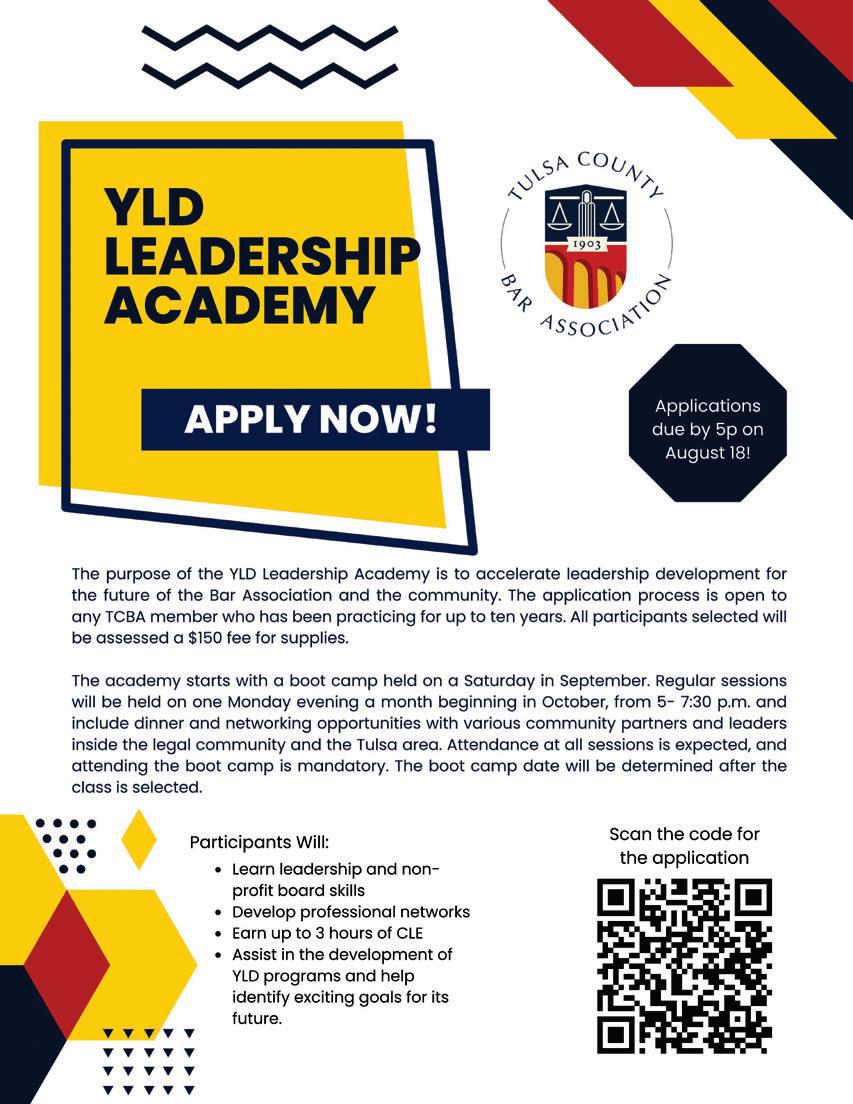
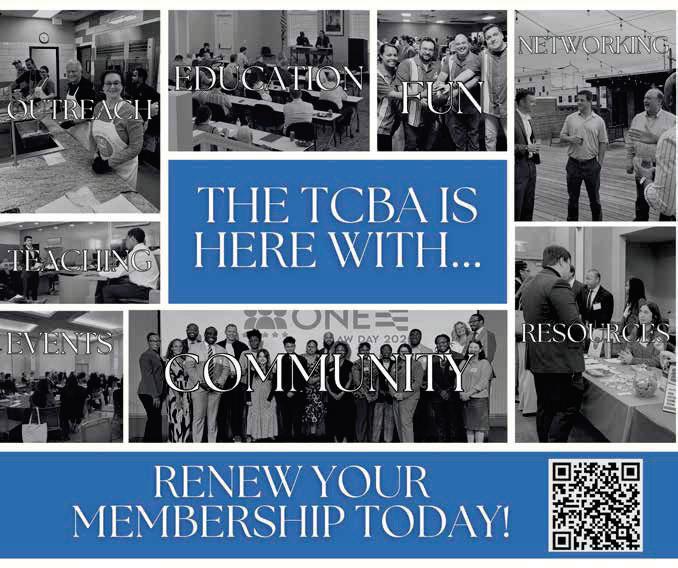
By being a member of the TCBA, you are also a member of the Tulsa County Bar Foundation. As a general rule, the funds that come into the Foundation are the result of a fundraising event for our community, and the monies raised are immediately distributed back out into the
In an effort to assist the Foundation, we have implemented a monthly “Fund the Foundation” program. To participate we are asking each member who has a birthday this month to consider making a donation to the Foundation. You can do so with the QR Code shown here.

If you are not currently a Fellow, please consider joining that program. As a thank you members), if you donate before the 10th of the month we will include a shout out to you in the next issue of Tulsa Lawyer Magazine.
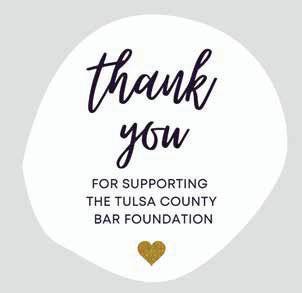
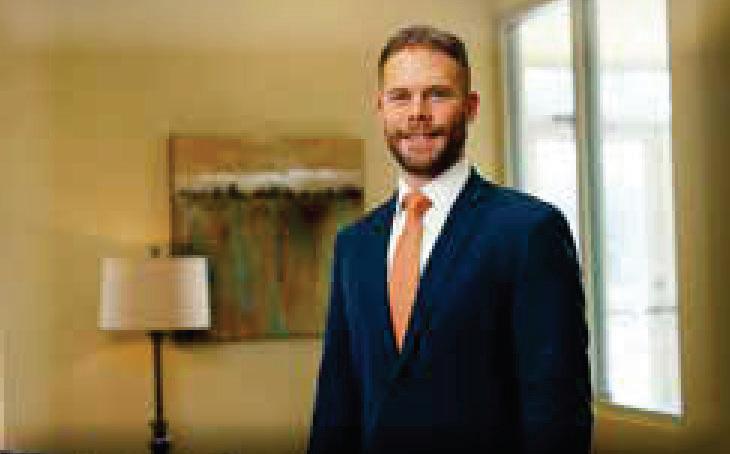
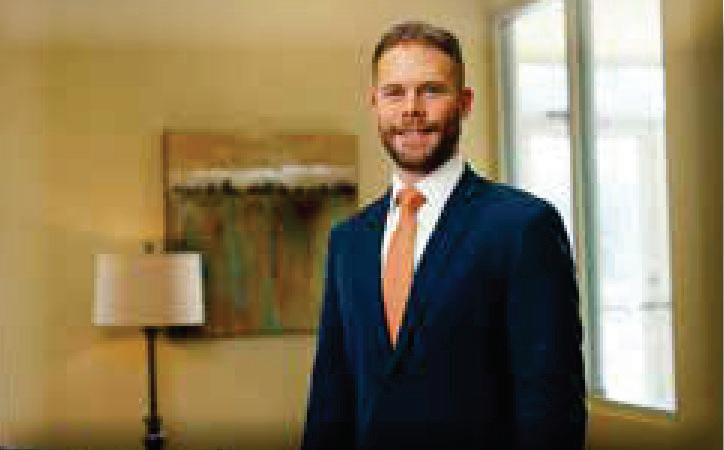

July is here, and with it comes not only the heat of summer but also a renewed opportunity to engage with one another and with the important work of the Tulsa County Bar Association. While many of us take this season to step away from the daily grind—whether for a long-awaited vacation or a simple change of pace—the TCBA continues to offer meaningful ways to stay active, involved, and connected.
At the heart of our organization are our committees. These working groups serve as the driving force behind many of our programs, events, and initiatives. Whether your interest lies in access to justice, diversity and inclusion, continuing legal education, or another area, there is a committee that
committee is not only a way to contribute to the profession— it is also a way to expand your network, share ideas, and help shape the direction of our local legal community.
In addition to committee work, the TCBA is proud to offer a variety of summer activities that create space for both professional growth and informal connection. From mixers to wellness events and section gatherings, these opportunities allow us to step outside the courtroom and connect as colleagues and peers. These events are especially valuable during a time when the pace of work may shift,
This season also brings one of our most important gatherings of the year—the TCBA Annual Meeting. This
event is more than a procedural milestone. It is a celebration of the work we have done together, a recognition of those who have served with distinction, and a moment to look ahead to the priorities and goals of the coming year. I encourage you to attend and lend your voice to the future of our organization.
Finally, July marks the start of our membership renewal period. While it may be easy to think of renewal as a routine task, I encourage you to see it as something more—a recommitment to your place in a profession built on service, accountability, and continued learning. In a time when the legal landscape is shifting rapidly, our strength lies in remaining connected. Your membership supports not just the services we offer, but the community we build together.
Summer may be a time to slow down, but it can also
take advantage of the opportunities in front of you to stay engaged with the TCBA, whether through a committee, a social event, or simply by renewing your membership with intention.
Let us continue to show up—for each other, for our profession, and for the community we serve.
Billy Duncan
TCBA Vice President 2024-2025

The Bar Center will be CLOSED Friday,July 4 th Independence Day!

“Freedom is not the right to do as we please, but rather the opportunity to do what is right.”
~ Reverend Peter Marshall, Chaplain of the U.S. Congress. (1902-1949; Prayer before the U. S. Senate, April 25, 1947.)
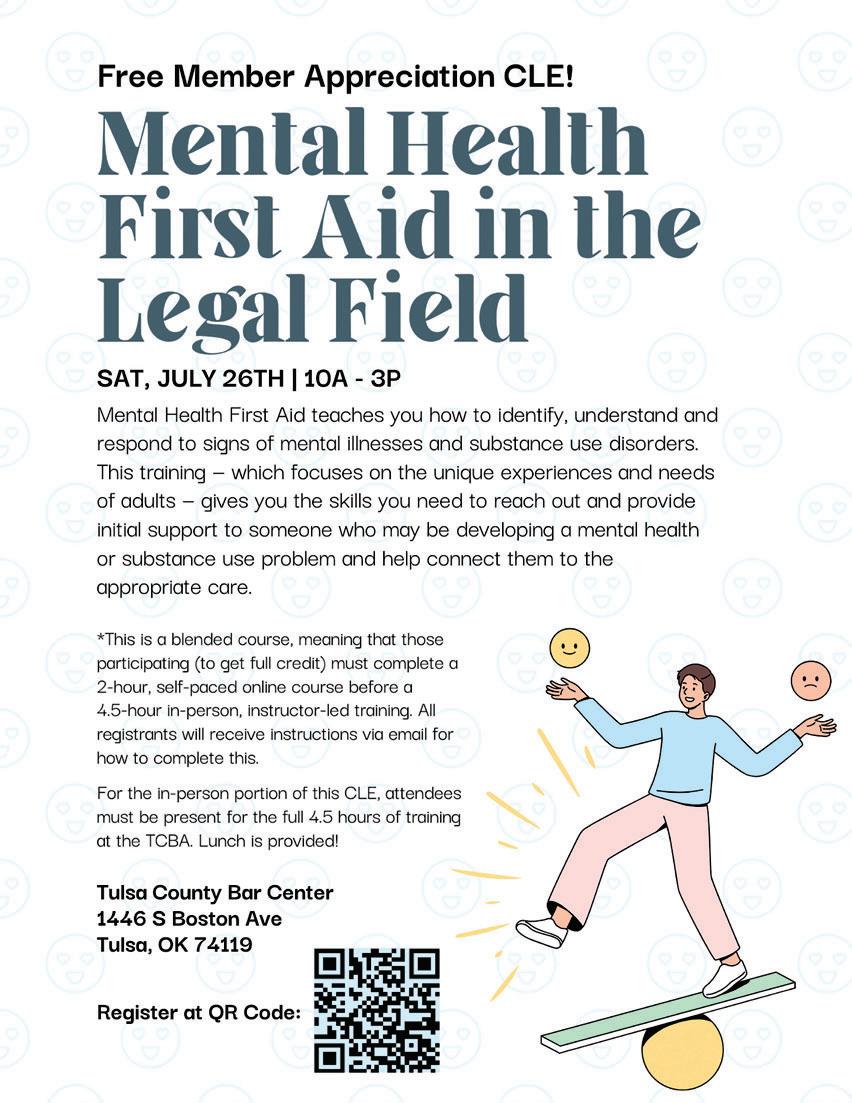



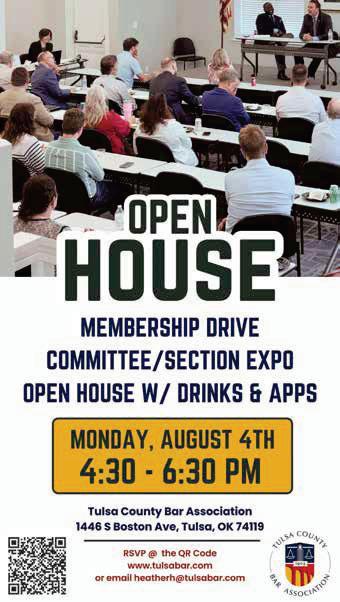

Although Book Club usually does not meet in August, a bonus book will be discussed at a surprise destination. The book is Secrets of the Sprakkar: Iceland’s Extraordinary Women and How They Are Changing the World. What is it I think about those Icelandic women? Contact heatherh@tulsabar.com or visit www.tulsabar.com
Note: Book Club generally meets at 5:30 p.m. on the fourth Tuesdays at the Bar Center, except August and December.
•July 22 - Calling for a Blanket Dance, Oscar Hokeah
•Augustinterested, to discuss Secrets of the Sprakkar: Iceland’s Extraordinary Women and How They Are Changing the World, Eliza Reid. Date TBD)
•September 23 - Anxious People, Fredrik Backman
•October 28 - When Will There Be Good News, Kate Atkinson
•November 25 - Book by H.W. Brands, American historian
Allen and Carol Pease
Miss Chance crossed over the rainbow bridge June 1, 2025, peacefully in our loving arms at home.
Chance came into my life when she was about three years old. She was found abandoned on the streets of Tulsa and was so matted and emaciated, the vet didn't realize she was a standard poodle until they bathed and gave her a haircut. Even though you can technically say I rescued her, in reality, she was the one who rescued me. The adoption agency had named her Ruby. Well, that wasn't going to work for me, so I renamed her Chance because we both needed a second chance in our respective lives, and I started calling her Miss Chance because I didn't want people to confuse her with a male dog. I quickly remembered there is nothing more healing than the unconditional love that your pet can bring into your life and Chance did just that.
Please forgive me for bragging about her a little. Right before I adopted her, I started volunteering for Meals on Wheels. Once Chance was in my life, I started taking her with me and we drove all of Tulsa together for several years, delivering meals to seniors and others who couldn't travel. She loved riding in cars and interacting with people. When the person would open their door to receive their meal and saw this adorable dog with me, their smiles would light up a room as we were probably the only people they got to talk to or see all day. Within six months after adoption, we started our therapy dog training, because let's face it, there is nothing more fun than being with your best buddy and spreading some love at the same time. This little stinker
"Top Dog" out of all the other beginning training classes at the training academy.
I can't think of a time when I ever returned from a therapy dog visit without Chance making a difference in
laugh so hard she probably wet her pants, to Chance sitting at the end of a woman's dying husband's hospice bed while she told us their love story as he laid there comatose. Did I mention the time she sat quietly in the lap of a 10-year autistic boy for over an hour while he was being cross examined in court with his parents in shackles not 10 feet away, or the time she visited a patient in the hospital who hadn't spoken in three days but started to speak as soon as Chance jumped up in bed with her, or when every child at the children's hospital wouldn't stop smiling when she entered their room and gave them high 5's despite their medical condition. For over ten years, Miss Chance visited hospitals, hospices, rehab facilities, veteran's centers, all types of schools including
school exams as well as being a reading partner at the Tulsa County Libraries, and any place she could bring some stressfree relief.
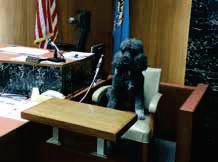
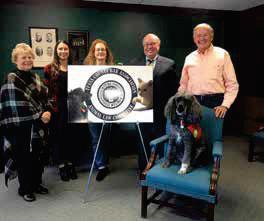

In 2015, she was selected to belong to the Special Dog Unit of the Tulsa County District Attorney's
molested, beaten, abused or traumatized, and she did this
Chance would be in their corner. She would sit and allow the child to rub on her as they had to repeat the awful things that had been done to them. Without the presence of Chance and her unconditional love, many of the children would not have been able to articulate their experiences. The Oklahoma Bar Association even gave her a special Outstanding Service to the Public Award for all her work,
as a retired attorney, I couldn't have been a prouder father, and Carol was with us when Miss Chance received her award at the 2018 Oklahoma Bar Association convention held in Tulsa. It's a pretty big deal for a dog to receive this award and upstage lawyers! We were blessed to have served with so many great therapy dog teams and groups, and Chancie got along with everyone. Carol came to love Chance as much as I did and the feeling was mutual. Miss Chance was truly a Therapy Dog ROCK STAR, and she
therapy dog, Chance was simply the best dog one could ever ask to have as a companion. She rarely barked, except when Coyotes got too close to our fence, got along great with other dogs, and was about as unassuming as any dog could ever be. All she wanted to do was to give love, take daily walks, and be your constant companion. Oh, how Carol and I are going to miss her.....
It strengthens us knowing that the small time God gave her on this earth was well spent doing his work. After all, GOD is DOG spelled backwards. We appreciate your
journey. God rest your soul Chancie - we will be with you again before you know it.....
Hall Estill is pleased to announce the election of two new Executive Committee members and one new member of
Denver and Northwest Arkansas, Hall Estill continues its legacy of legal expertise and client-focused service.
of our Executive Committee and Board of Directors,” said Steve Ray, Managing Partner at Hall Estill. “Their unique experiences and perspectives will be instrumental in guiding the future of
Executive Committee members:
Andrew J. Romanow
businesses and entrepreneurs on general business, transactional and regulatory matters, including formation and governance, litigation and event response, standards of conduct and internal investigations, compliance and risk management matters.
Steven A. Broussard practices in the Labor & Employment Law Section in the Tulsa labor disputes to discrimination. This is his third time serving on the Executive Committee. He has presented numerous employment-related seminars, speeches and programs for employees, managers, supervisors and staff, and has successfully defended numerous employers and supervisors in employment litigation and administrative proceedings in various jurisdictions.
New Director: Heather Flynn Earnhart
and General Civil Litigation arenas. Her primary practice areas include divorce, child custody, paternity actions and premarital Mediator through the Mediation Institute.

GableGotwals is pleased to announce that Jason Seay has joined
extensive experience advising clients on healthcare regulatory compliance, intelligence governance, and broader regulatory matters.
Prior to joining the Firm, Jason held in-house legal and compliance leadership roles at companies including GeneDx, a global genetics and diagnostics company, and DaVita, a leading healthcare provider. He also served as Associate General
Counsel for a regional health system in Alaska and represented state agencies as an Assistant Attorney General for the State of Oklahoma. He has additional private practice experience in healthcare law, civil litigation, and administrative law.
“Jason brings valuable experience in HIPAA compliance, breach response, data governance, and AI implementation, which will be a great addition to our Healthcare and Cybersecurity and Data Privacy teams,” saidTrent Shores,
background in both the public and private sectors strengthens our ability to support our clients across a range of industries.”
Jason earned his J.D. from the University of Tulsa
received a CALI Award in Philosophy of Law, and was a member of the Board of Advocates. He received his B.A. in Philosophy from the University of Oklahoma.
Fiasco & Edmonds announces three new associates have joined
Jordan L. Clapp graduated with highest honor from the University of Tulsa College of Law in 2023 after earning a Bachelor of Science in Business Administration from Oklahoma State University. While in law school, Jordan was a recipient of the Oklahoma Bar Foundation W.B. Clark Memorial Scholarship, a member of Phi Alpha Delta Law Fraternity, and received CALI Awards in Writing Seminar: Steal this Seminar and Public Defender Clinic. She is a member of the Oklahoma Bar Association and currently practices in civil litigation.
Nicholas N. Hartman graduated with highest honor from the University of Tulsa College of Law in 2023, after earning a B.S. in Economics from Duke University. While in law school, Nicholas served as Articles Selection Editor on the Tulsa Law Review and received CALI Awards in Legal Writing, Law & Literature, Criminal Law, and Criminal Justice & Public Policy. He is a member of the Oklahoma Bar Association and currently practices civil litigation with an emphasis in research and writing.
Michael D. Orcutt graduated with highest honor from the University of Tulsa College of Law in 2024, after earning a B.A. double major in Political Science and German from the University of Tulsa. While in law school, Michael received CALI Awards in Basic Oil & Gas Law and Piracy, Copiers, & Copyright in Law & Culture. In October 2024, he was published in the Journal of Christian Legal Thought’s volume on the legal of the Oklahoma Bar Association and currently practices in civil litigation with an emphasis in research and writing.
Don’t forget about the access your Tulsa County Bar Association membership card provides! Membership with the Tulsa County Bar Association provides more than just networking and access to continuing legal education. Your membership card contains the passcode to a large private meeting room located in the Tulsa County Law Library.
The large meeting room is able to seat up to 10 people, contains a boardroom style table, and has a desk supplies, such as paperclips, pens, postit notes, and staples. If you did forget your membership card, then simply see the law library staff at the counter for help.
If you are looking for a smaller space, or a quiet place away from others
then we also have a meeting room that comfortably seats up to three people. This meeting room has a desktop computer that may be used to access the internet, and outlets for those working off of a laptop.
Do you need a place to make a quick phone call, but don’t want to leave the courthouse? Then visit our small meeting room, which is a great place to
telephone available for you to call back
The Tulsa County Law Library is a quiet escape from the busy halls of the courthouse. The library is a great place to conduct legal research, and you can wait seated in one of our cushioned chairs while we make copies for you. We look forward to helping you soon!
John J. Bowling of Jenks, Oklahoma, died on Saturday, May 17, 2025. He was born March 18, 1970 in Jefferson City, Bowling. John graduated from Purdue University in 1992 with a bachelor’s degree in Political Science and Communications. He then attended law school at the University of Tulsa where he graduated in 1995. He loved Tulsa so much, that he decided to stay and begin his long, 30 year, career as a litigation attorney.
John began his legal career an associate for Martin and Associates and Best Sharp. He subsequently went in-house with the Hanover Insurance Group where he served as lead trial counsel for Oklahoma claims before becoming the Assistant City Attorney for Broken Arrow. John ultimately returned to his insurance defense practice by joining Angela Ailes & Associates where he remained for several years before joining Campbell.
John is remembered not only for his great skills as a trial attorney, but as a caring and generous soul. Those who knew him best loved his quirky sense of humor. He had a love for his dog, Lucy, and his favorite superhero was Batman!! John is survived by his mother, Christie, his sister, Helen Kimberly life itself. He will be missed.

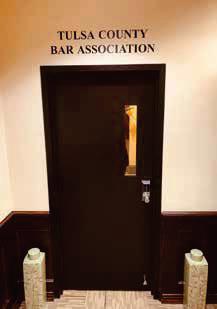
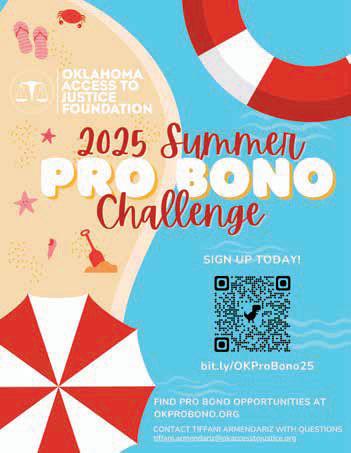
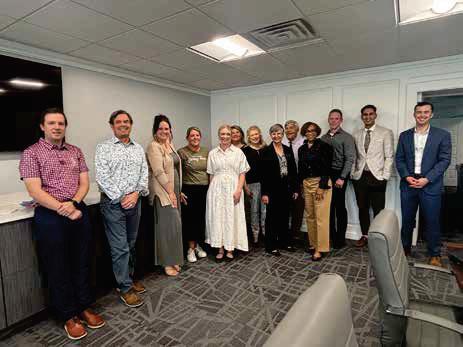

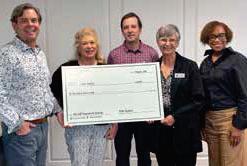

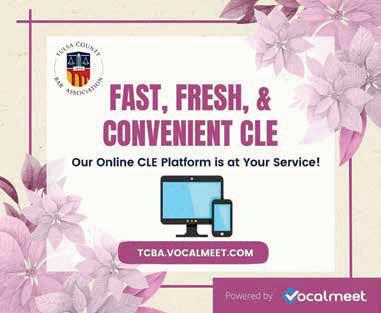


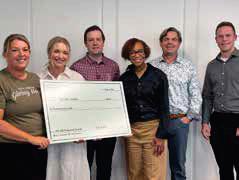



www.tulsabar.com
PHONE: 918-584-5243 FAX: 918-592-0208
Executive Director
Ext. 1002
Membership Director CLE, Sections & Committees
Front Desk Coordinator General Inquiries
Ext. 1000 Accounting
Ext. 1001
Lawyer Referral & Community Resource Navigator
Ext. 1003
Tulsa Lawyer Editors - Rhiannon Thoreson Madison Cataudella
Associate Editor - Milly Dunlap
Tulsa Lawyer Submissions - tulsabarnews@yahoo.com
President ..............................................................Stephanie Jackson
Past President.............................................................Mike Esmond
President-Elect.....................................................Michael Taubman
Vice President..............................................................Billy Duncan
Secretary....................................................................Shena Burgess
Treasurer..........................................................Mbilike Mwafulirwa
Budget/Internal Operations........................................John Gotwals
Foundation President ..................................................Justin Munn
President.....................................................................Justin Munn Treasurer...........................................................Catherine Hoopert
Trustee........................................................................Jim Gotwals
Trustee...........................................................................Ann Keele
Trustee..........................................................................Rick White
Trustee.........................................................................Lizzie Riter
Trustee ......................................................................Chad McLain
Trustee .......................................................................Kara Vincent
Trustee .....................................................................Mike Esmond
TCBA President................................................Stephanie Jackson
TCBA Pres. Elect..............................................Michael Taubman
CHAIRPERSONS
Access to Justice... .......................................................Katie Dilks
Animal Law ................................................................Katy Inhofe
Animal Law Co-Chair..............................................Erica Grayson
Bench & Bar........................................................Kevinn Matthews
Children & the Law.......................................................Lexie Allen
Children & the Law Co-Chair..............................Michael Nesser
CLE...............................................................................Open
Diversity Development...........................................Marvin Lizama
Diversity Development Vice-Chair ............................Matt Ingham Fee Arbitration.............................................................Scott Savage
Law Related Education / Street Law.........................Pierre Robertson
Law Related Education/Street Law Co-Chair............ Kara Vincent
Lawyer Referral ..........................................................Alan Barker
Mentoring ................................................................Shena Burgess
Mentoring Co-Chair................................................... Natalie Frost
Military/Veterans ..................................................Mitchell Garrett
Nominations & Awards .............................................Mike Esmond
Pro Bono................................................................. Shandi Stoner
Pro Bono Co-Chair ........................................................Eric Yoder
Professionalism ............................................................Rick White
Membership & Special Events..................................Natalie Sears
Membership & Special Events Co-Chair .......................Kara Pratt
Publications......................................................Rhiannon Thoreson
Publications Co-Chair .....................................Madison Cataudella
SECTION CHAIRPERSONS
ADR/Mediation................................................... .......Zack Brown
Bankruptcy ........................................................Hon. Paul Thomas
ABA Delegate............................................................. Molly Aspan
OBA Delegate..............................................................Philip Hixon
Presiding Judge .......................................... Hon. Dawn Moody
Chief Judge, U.S. District Court ...................Hon. John F. Heil, III
Chief Judge, Tulsa Municipal Court..........Hon. Gerald Hofmeister
TU Law School Student Representative ...................Eugene Flynn
TU Law School Representative.................................. Natalie Frost
YLD Chair............................................................Lacy Williamson
YLD Past-Chair.................................................Colton Richardson
YLD Chair Elect.............................................................Kyle Trice
YLD Vice President...................................................Isaiah Brydie
YLD Treasurer..........................................................Morgan Smith
YLD Secretary..........................................................Kaia Kennedy
Law Day Chair ....................................................Tana Van Cleave
Community Outreach................................................ Ashley Webb
Community Outreach Co-Chair...................... Madison Cataudella
Golf Chair................................................................Michael Thelen
Scholarship Chair........................................................Randy Lewin
Business/Corporate................................................Spencer Pittman
Criminal Law .........................................................................Open Energy & Mineral Law.............................................Buford Pollett
Employment Law ......................................................Chris Vaught
Family Law ..........................................Anastasia Krich-Mahoney
Health Law................................................................Shelby Fields
Immigration ................................................................Elissa Stiles
Immigration Vice-Chair ..............................................Karri Payne
Juvenile Law. .........................................................Michael Nesser
Juvenile Law Co-Chair..................................................Lexie Allen
Litigation................................Mbilike Mwafulirwa & Mark Smith
Municipal Law..................................................Rhiannon Thoreson
Paralegals/Legal Assistant.......................................Danna Malone
Paralegal /Legal Assistants Vice Chair.....................Sabrina Nitz
Paralegals / Legal Assistant - Secretary.......................Sheri Ward
Probate/Estate/Elder Co-chair............................... Phillip Jennings
Solo/Small Firm .......................................................Mary Clement
Tax Co-Chairs..............................John Gotwals / Lauren Peterson
Technology ...............................................................Trevor Riddle
Workers Comp...........................................................Valerie Evans
Workers Comp Co-Chair ..........................................Micah Felton
